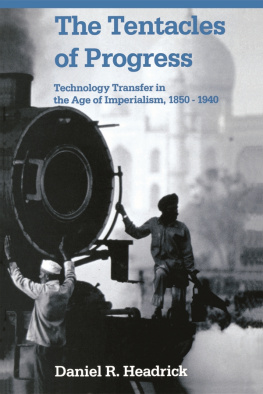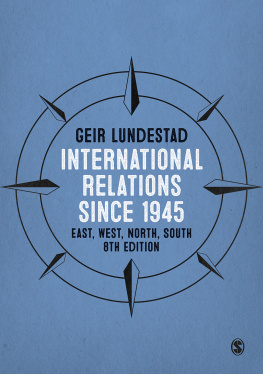Daniel R. Headrick - The Invisible Weapon: Telecommunications and International Politics, 1851-1945
Here you can read online Daniel R. Headrick - The Invisible Weapon: Telecommunications and International Politics, 1851-1945 full text of the book (entire story) in english for free. Download pdf and epub, get meaning, cover and reviews about this ebook. year: 1991, publisher: Oxford University Press, genre: Politics. Description of the work, (preface) as well as reviews are available. Best literature library LitArk.com created for fans of good reading and offers a wide selection of genres:
Romance novel
Science fiction
Adventure
Detective
Science
History
Home and family
Prose
Art
Politics
Computer
Non-fiction
Religion
Business
Children
Humor
Choose a favorite category and find really read worthwhile books. Enjoy immersion in the world of imagination, feel the emotions of the characters or learn something new for yourself, make an fascinating discovery.

- Book:The Invisible Weapon: Telecommunications and International Politics, 1851-1945
- Author:
- Publisher:Oxford University Press
- Genre:
- Year:1991
- Rating:4 / 5
- Favourites:Add to favourites
- Your mark:
- 80
- 1
- 2
- 3
- 4
- 5
The Invisible Weapon: Telecommunications and International Politics, 1851-1945: summary, description and annotation
We offer to read an annotation, description, summary or preface (depends on what the author of the book "The Invisible Weapon: Telecommunications and International Politics, 1851-1945" wrote himself). If you haven't found the necessary information about the book — write in the comments, we will try to find it.
The Invisible Weapon: Telecommunications and International Politics, 1851-1945 — read online for free the complete book (whole text) full work
Below is the text of the book, divided by pages. System saving the place of the last page read, allows you to conveniently read the book "The Invisible Weapon: Telecommunications and International Politics, 1851-1945" online for free, without having to search again every time where you left off. Put a bookmark, and you can go to the page where you finished reading at any time.
Font size:
Interval:
Bookmark:
THE INVISIBLE WEAPON
Telecommunications and International Politics 18511945
DANIEL R. HEADRICK


Oxford University Press is a department of the University of Oxford.
It furthers the Universitys objective of excellence in research, scholarship, and education by publishing worldwide.
Oxford New York
Auckland Cape Town Dar es Salaam Hong Kong Karachi Kuala Lumpur Madrid Melbourne Mexico City Nairobi New Delhi Shanghai Taipei Toronto
With offices in
Argentina Austria Brazil Chile Czech Republic France Greece Guatemala Hungary Italy Japan Poland Portugal Singapore South Korea Switzerland Thailand Turkey Ukraine Vietnam
Oxford is a registered trade mark of Oxford University Press in the UK and certain other countries.
Published in the United States of America by Oxford University Press
198 Madison Avenue, New York, NY 10016
Oxford University Press 1991
First issued as an Oxford University Press paperback, 2012.
All rights reserved. No part of this publication may be reproduced, stored in a retrieval system, or transmitted, in any form or by any means, without the prior permission in writing of Oxford University Press, or as expressly permitted by law, by license, or under terms agreed with the appropriate reproduction rights organization. Inquiries concerning reproduction outside the scope of the above should be sent to the Rights Department, Oxford University Press, at the address above.
You must not circulate this work in any other form
and you must impose this same condition on any acquirer.
Library of Congress Cataloging-in-Publication Data
Headrick, Daniel R.
The invisible weapon : telecommunications and international politics, 18511945 / Daniel R. Headrick.
p. cm. Includes bibliographical references and index.
ISBN 978-0-19-506273-6 (hardcover); 978-0-19-993033-3 (paperback)
1. TelecommunicationHistory.
2. TelecommunicationPolitical aspectsHistory.
3. TelecommunicationMilitary aspectsHistory.
4. World politics19001945.
5. World politics19th century.
I. Title.
HE7651.H43 1991 90-39697
384-dc20
Printed in the United States of America on acid-free paper
Looking back on this twentieth century in its waning moments, I am struck by the ambiguous feelings humans have toward the world they have created. People the world over are fascinated by technology and look to it as a panacea to solve their problems. Yet modern technology comes with a host of surprising and unpleasant byproducts. Among the least understood is interdependence. For modern technology does not occur as isolated units, but as complex systems that require ever more widespread interactions and interdependence. Thus the more technologically advanced a country becomes, the more it depends on raw materials, manufactured goods, information, and services from around the world.
This interdependence is disturbing, even frightening to many people. It is no coincidence that the twentieth century has been the age of mass movements to withdraw from the very interdependence that modern technology requires, movements ranging from nationalist struggles of liberation to attempts to gain economic autarky or create racially homogeneous societies. Not only do humans fight one another, but they also rebel against the kind of world that unfettered technological and economic forces would impose on them, a world of interdependence, trade, and communications.
Telecommunications are among the technologies most involved in this process: they are very complex, they readily form systems and networks, and they both require and encourage global interdependence. Yet during much of our century, telecommunications have been controlled, twisted, and distorted by politics in order to separate and alienate peoples. This book is an attempt to understand this paradox.
A book like this is the result of the labors of many persons, and their mention on this page is but a small recognition of their important contributions. I would first like to thank the National Endowment for the Humanities for its support of this project through a Fellowship for College Teachers and two Travel to Collections grants.
I am also thankful to those who have helped me most in my research: Cable and Wireless pic and the keeper of their archives, Peter Travers-Laney; Jerry Hess and David Pfeiffer of the National Archives in Washington; R. M. Coppock of the Ministry of Defence in London; and the friendly, helpful staffs of the Public Record Office at Kew, the British Library in London, and the Joseph Regenstein and John Crerar Libraries in Chicago.
Numerous friends and fellow-scholars have encouraged my efforts, or given me their thoughtful criticism, or both. They are: Jorma Ahvenainen, Hugh Aitken, Jean-Claude Allain, Catherine Bertho-Lavenir, Andrew Butrica, Patrice Carr, Ivan Coggeshall, Donard de Cogan, Kate Ezra, Pascal Griset, Robert Kubicek, Bill and Jane McCullam, Joel Mokyr, David and Nancy Northrup, Jon Sumida, Yuzo Tak-ahashi, Frank Thomas, Gary Wolfe, Mark W. Zacher, and Zhong Zhang.
My editor, Nancy Lane, deserves special thanks for her unfailing encouragement over many years.
This book is dedicated to the memory of my wife Rita, from whom I learned how to become a historian, and much else.
Chicago | |
Summer 1990 | D.R.H. |
THE INVISIBLE WEAPON
When the telegraph was introduced in Australia in 1853, the Melbourne Argus went into an ecstasy of rhetoric: We call the electric telegraph the most perfect invention of modern times... as anything more perfect than this is scarcely conceivable, and we really begin to wonder what will be left for the next generation, upon which to expend the restless energies of the human mind.
The enterprises to which de Lesseps was referring were the new means of transportation and communicationthe railways, steamships, canals, and telegraphsthat thrilled so many in the nineteenth century. Had he lived to see the inventions of the next century, he might have been just as amazed, but he would surely not have thought that they could make people finally cease fighting. If we have learned anything in the past century, it is that technology confers power, but that the consequences of that power are anything but predictable.
The relations between communication and politics are complex, and to make sense of them we first need to identify some of the relevant characteristics of communications systems. Like the mails, point-to-point telecommunications systems convey information to specific recipients. In addition, they have five other important qualities. The first four of thesespeed, coverage, reliability, and costare technical and economic, while the fifth, security, is political and organizational in nature.
Speed is the most striking characteristic of telecommunications. What triggered the explosion of demand for the new technology was the incredible speed of electricity and its inherent promise of real-time information. In 1901 Captain George Squier of the U.S. Army Signal Corps expressed the astonishment of his age when he wrote: The fastest mail express, or the swiftest ocean ship, are as naught compared with the velocity of the electrical impulse which practically annihilates any terrestrial dimension. Though much faster than the mail, the early telegraphs were by no means instantaneous in relaying information, but were slowed down by both technical and organizational delays. Because so much information quickly becomes stale, governments, businesses, and newspapers encouraged improvements in the efficiency of telecommunications.
Next pageFont size:
Interval:
Bookmark:
Similar books «The Invisible Weapon: Telecommunications and International Politics, 1851-1945»
Look at similar books to The Invisible Weapon: Telecommunications and International Politics, 1851-1945. We have selected literature similar in name and meaning in the hope of providing readers with more options to find new, interesting, not yet read works.
Discussion, reviews of the book The Invisible Weapon: Telecommunications and International Politics, 1851-1945 and just readers' own opinions. Leave your comments, write what you think about the work, its meaning or the main characters. Specify what exactly you liked and what you didn't like, and why you think so.







